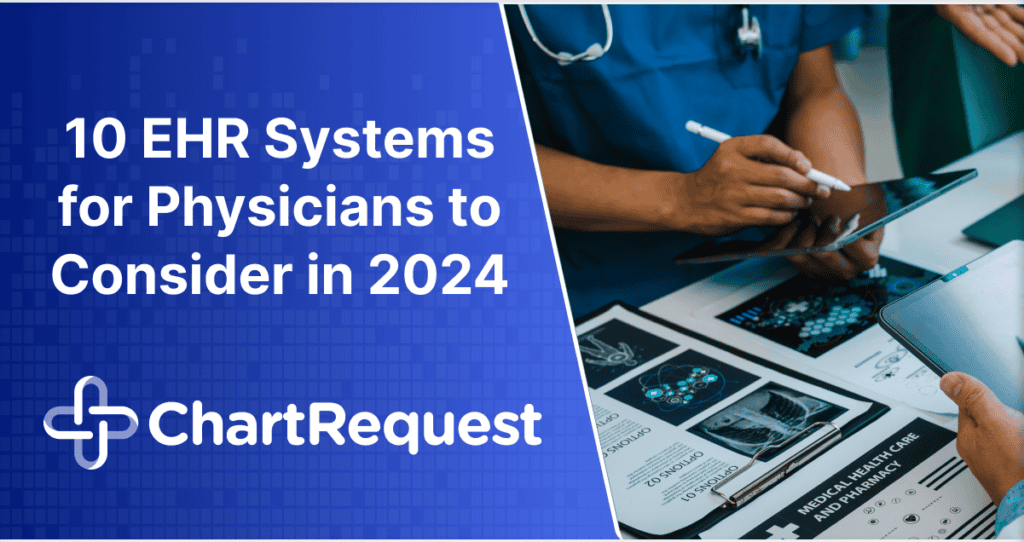Medical imaging systems offer healthcare providers invaluable insight regarding internal issues without requiring invasive techniques. Whether you’re a patient in need of an old x-ray or a referring physician trying to share patient imaging records with a specialist, you need your health records requests fulfilled as quickly as possible.
In the past, healthcare providers had to transport medical imaging records via disc, usually in the DICOM format. DICOM is the standard file type for our healthcare system because it’s an accessible, lossless image format with plenty of metadata space for the patient’s health data. As healthcare technology evolves, so do expectations regarding the speed of exchange.
Electronic information systems make medical records access faster than ever, but the process is complicated. When physicians coordinate patient care, they need to exchange patient data over a secure, HIPAA-compliant platform. With the potential risks associated with medical records exchange, it can be difficult choosing the right service.
To help simplify this process, we’ve gathered a list of the top medical and DICOM imaging record exchange companies.
PocketHealth
Canadian software company PocketHealth, founded in 2016, helps patients, providers, and hospitals quickly share and receive medical imaging files. Their bank-level encryption and PHIPA/HIPAA compliance ensure protection both for covered entities and patient information.
Their patient-centric business model puts the power of sharing medical records into the patients’ hands. By promoting patients to request their own records to distribute when needed, they hope to improve care coordination between providers.
They score 3.9 on Google Reviews. Many patients praised the simplicity and speed of sharing medical images with PocketHealth compared to using physical discs. The negative reviews seem to primarily complain about slow fulfillment of imaging requests, issues with account verification, and difficulty reaching customer service.
AmbraHealth
New York software company Ambra Health, founded in 2004, has a long history of aiding patients, providers, and hospitals in secure, cloud-based DICOM and non-DICOM image exchange. Additionally, their DICOM file web viewer removes any need to download additional software to review the images.
AmbraHealth does not have Google reviews, but the company’s reviews average a score of 4.4 on Capterra. In addition to the software’s improvements over the traditional method of sharing medical images via discs, many customers report positive experiences with AmbraHealth’s customer service team.
The most common complaint from customers appears to be that the cloud-based method of storage makes images take too long to load when the internet is slow. Some customers also described inconvenient processes that hinder the user experience.
Change Healthcare
Based in Nashville, TN, Change Healthcare, originally known as Emdeon, offers medical imaging exchange as one of its many services. They’re also known for being the largest financial and administrative information exchange in the USA.
Change Healthcare also does not have Google reviews, but they managed to receive an average rating of 4.8 on Featured Customers. Unfortunately, the reviews focus more on their primary services rather than medical imaging exchange. With the company’s resources, experience, and reputation though, it’s likely they have developed a polished product.
Medchart
Founded in Canada in 2015, Medchart works to improve the medical and imaging records request process primarily for law and insurance clients. Medchart recently raised $17 million from investors thanks to their software’s artificial intelligence and machine learning capabilities.
Despite Medchart’s broad array of offerings, they only scored an average rating of 3.5 on Google Reviews. While their website lists over 120,000 requests fulfilled, only 8 individuals have left reviews. The positive reviews have no text accompaniment. The negative reviews, however, express frustration with their sales manager, user experience, and delayed return of requested records.
Nuance PowerShare
With a storied history in AI speech and text recognition, Nuance acquired more than 50 other companies before being bought by Microsoft for $19.7 billion. Among their vast offerings is Nuance PowerShare, a medical image and diagnostics exchange program designed for portability and ease of access.
There are no Google reviews for Nuance Powershare, but their website features several case studies highlighting real-life applications of their software and the resulting benefits. Additionally, most of the reviews on the Apple app store praise the functionality, user interface, and convenience of reviewing medical records on a mobile device.
ChartRequest
ChartRequest offers medical, billing, and DICOM-friendly imaging records exchange services to patients, law and insurance professionals, and healthcare providers. The company was founded in 2012 and is based in Atlanta, GA. Not favoring one type of client, ChartRequest has developed and continues to improve unique workflows based on the user’s background.
The professionals at ChartRequest understand that every client is unique and every case is different. In addition to offering separate workflows for each client type, we also offer additional services and subscriptions to help professionals and facilities customize their services based on their needs.
On Google Reviews, ChartRequest has achieved an average rating of 4.7. Most reviewers praised the customer service team’s quick and thorough assistance with any issues that arise. Additionally, many people report having an incredible user experience, faster turnaround times, and reduced costs.
ChartRequest remains at the forefront of innovation when it comes to medical, billing, and imaging record retrieval. To find out exactly why our clients are so thrilled with our retrieval services, set up a demo today!








